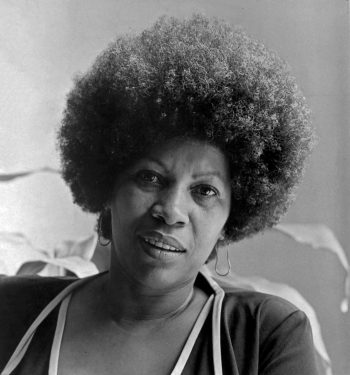This content is being reviewed in light of recent changes to federal guidance.
Toni Morrison & Black Feminism

Late-twentieth century black feminist critiques written about Toni Morrison’s fiction framed her as an invaluable figure within the black feminist tradition, On March 3rd, 2020, in response to a New York Magazine article, “The Best Books for Budding Black Feminists, According to Experts,”, Dr. Sami Schalk tweeted, “To be on a Black feminist reading list alongside baddies like [Roxanne Gay], [Brittany Cooper], & [Janet Mock], as well as black feminist foremothers like Toni Morrison, Audre Lorde & Octavia Butler is incredibly humbling. I’ve read almost every book on this list” (Schalk 2020). Black women literary critics and scholars have focused on how Morrison’s work centers and highlights the complexities of Black women’s lived experiences throughout her novels. Here are three useful critical essays published during the late-twentieth century that have helped frame the importance of Morrison’s work in Black feminist critical thought:
Barbara Smith’s groundbreaking essay “Toward a Black Feminist Criticism” (1977) helped push ongoing conversations in Black feminist scholarship forward. It offers a critical analysis of Morrison’s Sula as a lesbian novel because of Sula and Nel’s friendship, but also due to Morrison’s critical perspective towards heterosexual male/female relationships, marriage, and the family unit. Overall, Smith believes Sula poses important feminist questions about black women’s agency and how Black women influence each other’s lives. Smith’s essay was originally featured in Conditions: a feminist magazine of writing by women with a particular emphasis on writing by lesbians in Fall 1977.

Photo by C.B. Claiborne
In her essay, “New Directions for Black Feminist Criticism,” (1980) Deborah E. McDowell tries to extend the conversation Smith started three years prior in her analysis of Sula as a lesbian novel. She believes Smith’s definition of lesbianism is imprecise and oversimplified but does agree with Smith’s call for a more innovative critical approach to Black women’s literature. McDowell believes reading Sula exclusively from a lesbian perspective leaves out the novel’s depth and complexity, as well as “its skillful blend of folklore, omens, and dreams” (McDowell). McDowell’s essay was published in the Black American Literature Forum in Winter 1980.
Barbara Christian’s “Trajectories of Self-Definition: Placing Contemporary Afro-American Women’s Fiction” (1985) places Morrison’s novels into conversation with the fiction of other women writers like Alice Walker, Gloria Naylor, Toni Cade Bambara, and Paule Marshall. She argues Morrison’s fiction is unique because it interrogates the intersections of sexism, racism, and class privilege in the Western world while reminding readers there is no straightforward solution to escaping oppressive systems of power regardless of race or gender. Christian’s essay was included in Marjorie Pryse and Hortense J. Spillers’ edited collection, Conjuring: Black Women, Fiction, and Literary Tradition (1985).
Toni Morrison’s novels published throughout the late-twentieth century serve as important contributions to the development of Black feminist ideologies and Black women’s literature. Smith, Christian, and McDowell’s essays place Morrison’s fiction into conversation with the works of other Black women writers, while advancing ongoing conversations in Black feminist scholarship. Mapping and identifying similarities and differences across Black women’s literature allows us to acknowledge how the literary tradition has transformed over time, but also how it mirrors subsequent shifts in Black feminism.
 Jade Harrison is a first-year Ph.D. student in African-American literature at the University of Kansas. She’s also the project manager for the Project HBW’s Black Book Interactive Project (BBIP). Harrison’s research interest includes using data to trace shifting representations of African-American women writers across Black literary anthologies.
Jade Harrison is a first-year Ph.D. student in African-American literature at the University of Kansas. She’s also the project manager for the Project HBW’s Black Book Interactive Project (BBIP). Harrison’s research interest includes using data to trace shifting representations of African-American women writers across Black literary anthologies.